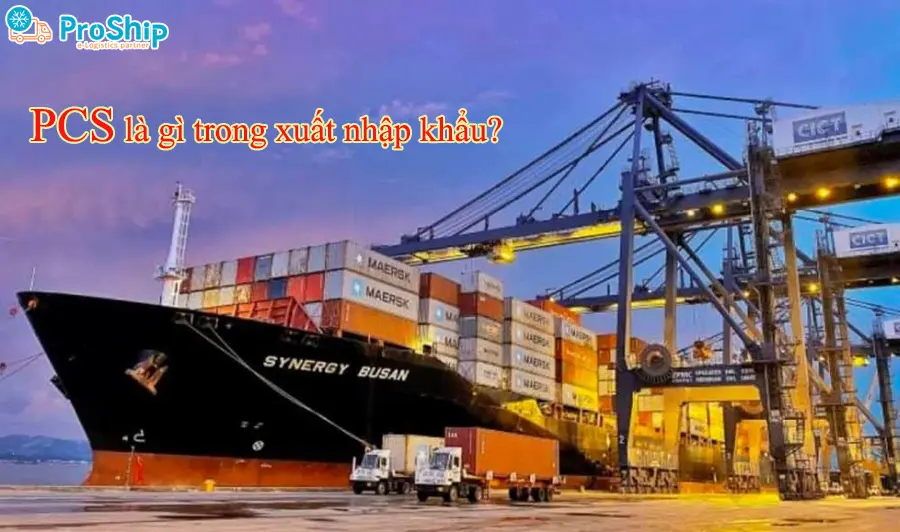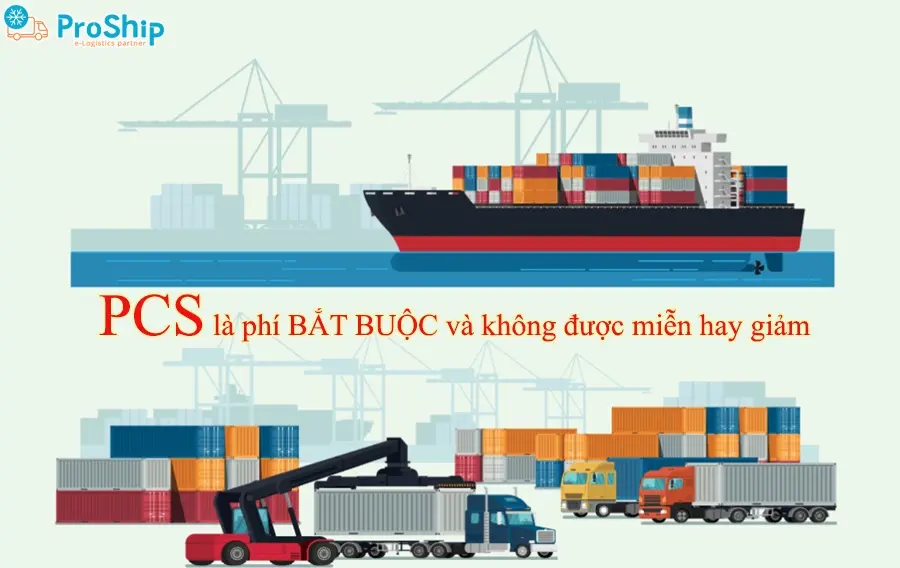x Bạn thắc mắc PCS là gì trong xuất nhập khẩu? Cách tính thế nào? Đối tượng nào phải trả khoản phí PCS này?
x Doanh nghiệp bạn đang tham gia trong lĩnh vực XNK và phải chi trả hoặc nghe qua nhiều khoản phí, trong đó có phí PCS?
x Và các chủ hàng, doanh nghiệp XNK đang tìm cách thương lượng về mức phí PCS với đối tác vận chuyển?
Hãy cùng Proship.vn chúng tôi cập nhật kiến thức cần biết giúp bạn hiểu rõ PCS là gì trong xuất nhập khẩu hàng hóa, PCS có vai trò gì, cách tính phí PCS thế nào chuẩn nhất, cách để thương lượng mức phí PCS hiệu quả với đối tác vận chuyển,…ngay sau đây.
PCS là gì trong xuất nhập khẩu?
Trong xuất nhập khẩu, PCS được sử dụng như đơn vị tính toán. Để hiểu rõ hơn khái niệm và vai trò của PCS, cùng tìm đọc nội dung sau:
PCS là gì?
PCS là gì trong xuất nhập khẩu? PCS là viết tắt của “Port Congestion Surcharge” (phụ phí tắc nghẽn cảng) là một loại thuế ở bến cảng. Theo đó, thuế PCS sẽ được tính cho tàu và hàng hóa khi tàu cập bến, có ảnh hưởng đến số lượng hàng khi vào cảng, từ đó giá cả trong kinh doanh cũng sẽ bị tác động.

Vai trò của PCS trong xuất nhập khẩu
Trong lĩnh vực XNK, PCS đóng vai trò quan trọng trong việc cải thiện hiệu quả và hiệu suất các hoạt động biển. Phụ phí này góp phần tạo điều kiện thuận lợi cho quá trình vận tải hàng hóa, đảm bảo thông tin liên quan giữa các đơn vị tham gia được chia sẻ nhanh chính xác.
- Tối ưu hóa thời gian xếp dỡ hàng hóa:
Việc tối ưu hóa thời gian xếp dỡ hàng tại cảng là một trong những vai trò quan trọng của PCS. Theo đó, thông qua việc quản lý lịch trình và các tài nguyên cảng biển, PCS sẽ giúp giảm thời gian chờ đợi tàu và xe tải.
- Quản lý các thông tin vận tải:
PCS đóng vai trò cung cấp nền tảng quản lý thông tin vận tải hàng hóa. Hoạt động này gồm thông tin về hóa đơn, lô hàng và vận đơn hàng hóa. Điều này giúp đảm bảo mọi giao dịch được lưu lại chính xác và giảm thiểu sai sót.
Ý nghĩa thuật ngữ PCS trong một số ngành khác
Tùy lĩnh vực sử dụng mà thuật ngữ PCS mang nhiều ý nghĩa:
- Vận chuyển hàng hóa: PCS là đơn vị tính ước lượng số lượng hàng hóa;
- Truyền thông: PCS viết tắt của Personal Communication Service, dịch vụ di động không dây cung cấp kết nối và truyền thông cá nhân hóa;
- Game: PCS chỉ Pacific Championship Series, giải đấu thể thao điện tử cho tựa game Liên Minh Huyền Thoại (LMHT);
- Kinh doanh và sản xuất: PCS đại diện cho Pieces, đơn vị tính cho sản phẩm như “cái”, “trái”, “mẩu”;
- In ấn: PCS là viết tắt của Print Contrast Signal, tín hiệu tương phản in, đo độ sáng mã vạch để đảm bảo chất lượng in ấn.
Ai phải trả phí PCS? Đơn vị tính PCS của quốc gia nào?
Vậy, ai phải trả khoản phí PCS này và đơn vị tính này của quốc gia nào? Đó là:
Đối tượng phải trả phí PCS
Phí PCS áp dụng cho các Công ty vận chuyển, Doanh nghiệp xuất nhập khẩu và các cảng tàu:
- Cảng biển thu phí PCS để duy trì hoạt động, giảm ảnh hưởng từ tắc nghẽn và tối ưu hóa quá trình xếp dỡ hàng hóa;
- Các Công ty vận chuyển phải trả phí PCS cho cảng khi tình trạng tắc nghẽn xảy ra, ảnh hưởng đến thời gian cập bến và dỡ hàng;
- Doanh nghiệp xuất nhập khẩu thường sẽ chịu phí PCS thông qua các hợp đồng vận chuyển đã thỏa thuận với hãng tàu.

PCS là đơn vị tính của quốc gia nào?
PCS là đơn vị tính phổ biến toàn cầu, đặc biệt trong thương mại và mua bán quốc tế. Đơn vị này xuất hiện thường xuyên trong giao dịch, hóa đơn và văn bản pháp lý tại nhiều quốc gia, bao gồm các nước Châu Âu, khi đề cập đến số lượng sản phẩm.
Cách tính toán, áp dụng PCS trong xuất nhập khẩu
PCS là gì trong xuất nhập khẩu đã được chia sẻ ở trên. Vậy, cách tính toán và áp dụng PCS thế nào? Việc tính toán và áp dụng PCS phụ thuộc vào loại hàng hóa, cách đóng gói, và các quy định trong hợp đồng giữa người mua và người bán:
Tính PCS theo sản phẩm nhỏ lẻ: Nếu hàng hóa được tính theo từng sản phẩm riêng lẻ, số lượng PCS sẽ bằng tổng số sản phẩm.
* Ví dụ: Một lô hàng gồm 500 cái áo thun -> 500 PCS.
Tính PCS theo yêu cầu đặc biệt: Với hàng rời hoặc hàng hóa không đóng gói (như thép cuộn, thanh nhôm dài), PCS có thể tính bằng đơn vị khối lượng (kg, tấn) hoặc chiều dài (m).
* Ví dụ: 10 cuộn thép -> 10 PCS.
Tính PCS cho các sản phẩm đóng gói khác biệt: Nếu mỗi kiện hoặc gói có số lượng sản phẩm khác nhau, cần tính PCS riêng lẻ rồi cộng lại.
* Ví dụ:
- Thùng A: 50 sản phẩm -> 1 PCS thùng.
- Thùng B: 30 sản phẩm -> 1 PCS thùng.
- Tổng cộng: 2 PCS (thùng).
Tính PCS theo kiện hoặc thùng hàng: Khi hàng hóa được đóng gói trong kiện, thùng, hoặc bao, PCS được tính dựa trên số lượng kiện hàng.
* Ví dụ: Một lô hàng gồm 20 thùng, mỗi thùng chứa 100 sản phẩm -> 20 PCS thùng hàng.
Phí PCS có được miễn giảm không và làm sao để thương lượng với đối tác vận tải?
Phí PCS là gì trong xuất nhập khẩu đã được giải thích ở trên kèm cách tính và áp dụng hiệu quả. Vậy, liệu PCS có được miễn hay giảm không và làm thế nào để có thể thương lượng được mức phí PCS với đối tác vận chuyển? Câu trả lời như sau:
Phí PCS có được miễn, giảm không?
PCS là phí bắt buộc và không thể được miễn hay giảm. Song có một số cách giảm thiểu sự ảnh hưởng của PCS như chọn cảng ít bị tắc nghẽn, chọn tàu có thời gian chờ đợi ngắn, chọn hình thức vận chuyển qua đường hàng không hay đường bộ,…
Ngoài ra, hãy theo dõi thông tin tình hình tắc nghẽn tại các cảng cũng như các thông báo về PCS từ các chủ tàu, từ đó có kế hoạch vận chuyển phù hợp.

Cách thương lượng mức phí PCS với đối tác vận tải
Để thương lượng phí PCS với đối tác vận tải, có thể cân nhắc áp dụng:
- Xây dựng mối quan hệ lâu dài: Đàm phán hợp đồng dài hạn hoặc cam kết khối lượng hàng lớn để có thể yêu cầu giảm phí PCS;
- Thương lượng linh hoạt: Đưa ra các điều kiện như thay đổi thời gian giao hàng, chọn cảng khác hoặc điều chỉnh phương thức vận chuyển để giảm phí PCS;
- So với các đối thủ: Tìm hiểu phí PCS của các hãng vận tải khác để đưa ra đề xuất cạnh tranh;
- Làm rõ yếu tố gây tắc nghẽn: Xác định nguyên nhân tắc nghẽn cảng và thảo luận để giảm phí nếu không phải lỗi do bạn;
- Tận dụng các chương trình ưu đãi: Hỏi về các chương trình khuyến mãi hoặc giảm phí trong mùa thấp điểm.
PCS là gì trong xuất nhập khẩu cùng những kiến thức liên quan tới phí Port Congestion Surcharge đã được chia sẻ để các bên liên quan như Công ty vận chuyển, Doanh nghiệp XNK và các cảng tàu có thể theo dõi để hiểu rõ về phụ phí tắc nghẽn cảng bắt buộc này. Quý khách có nhu cầu sử dụng Dịch vụ vận chuyển container đường biển Nội địa và Quốc tế tại Proship Logistics, liên hệ ngay 0909 344 247.

